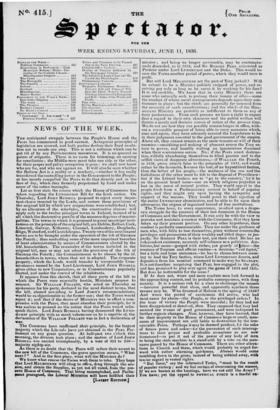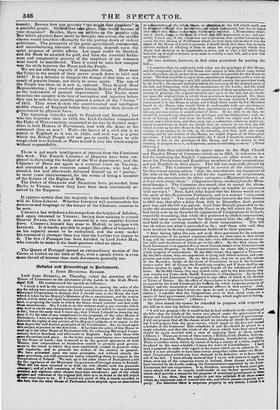NEWS OF THE WEEK.
THE anticipated struggle between the People's House and the Peers has commenced in good earnest. Antagonist principles of legislation are avowed, and both parties declare their fixed resolu- tion not to recede one step. This is not a collision which can be got rid of by any Parliamentary manceuvre. It is no quarrel on points of etiquette. There is no room for trimming, no opening for conciliation ; the Middle-men must take one side or the other, for their proper and paltry occupation is gone : we shall now know who are for, and who are against us. It will also be seen whether the Reform Act is a reality or a mockery,—whether it has really transferred the controlling power in the Government to the People; or has merely compelled the Peers to do that directly and in the face of day, which they formerly perpetrated by fraud and under cover of the rotten boroughs. Let us first state the course which the House of Commons has taken regarding the LYNDHURST Bill for the Irish nation. On Thursday, Lord JOHN RUSSELL proposed to reject every impor- tant clause inserted by the Lords, and restore those provisions of the original bill by whictinew corporations were established; but, 'by an alteration of the schedules, the constructive clauses will apply only to the twelve principal towns in Ireland, instead of to all which the destructive portion of the measure deprives of munici- palities. The towns to which it is proposed to grant municipal insti- tutions on the principle of the original bill, are Dublin, Belfast, Cork, Limerick, Galway, Kilkenny, Clonmel, Londonderry, Drogheda, Sligo, Waterford, and Carrickfergus. Twenty- two of the next largest towns are to be brought under the operation of the 9th of GEORGE the Fourth ; thus controlling some of the more important branches of local administration by means of' Commissioners elected by the 10/. householders. The remainder of the towns included in the original bill, may or may not adopt the provisions of the 9th of GEORGE the Fourth ; the Commissioners to be chosen by the 51. householders in towns, where that act is adopted. The corporate property, which the Lords would transfer to irresponsible Com- missioners named by the Lord-Lieutenant, Lord JOHN RUSSELL gives either to new Corporations, or to Commissioners popularly elected, and under the control of the inhabitants.
It appears from this sketch, that all those parts of the bill to which the Peers were especially hostile, Ministers propose to reinsert. Sir WILLIAM FOLLETT, who acted on Thursday as spokesman for his party, declared in the most distinct terms, that the bill, altered according to Lord JOHN'S recommendations, would be as objectionable as the former one; that the Tories would reject it; and that if the desire of Ministers was to effect a com- promise with the Peers, they must abandon their principle, for it was useless to proceed on the notion that the Peers would relin- quish theirs. Lord Jowl RUSSELL having denounced the Limn- BURST principle with as much vehemence as he is capable of; the ,declaration of Sir WILLIAM FoLLarr was in fact a declaration of
War.
The Commons have reaffirmed their principle, by the largest majority which the Liberals pave yet obtained in the PEEL Par- Jiament on any great question. At half-past two o'clock this morning, the division took place; and the motion of Lord JOHN RUSSELL was carried triumphantly, by a vote of 324 to 238-- majority eighty-six.
As there is no doubt that the Peers will refuse their assent to the new bill of the Commons, the grave question occurs, "What next ? " And in the first place. what will the Ministers do ?
We know what course t he Tories wish them to take. They hope that Lord MELBOURNE will cling to office, drag through the ses- sion, and obtain the Supplies, as yet not all voted, from the pre- sent House of Commons. That being accomplished, and Parlia- raeut prorogued, the Liberal Ministers will have fulfilled their
mission ; and being no longer serviceable, may be contemptu- ously discarded, as in TRU and Sir ROBERT PEEL reinstated as Premier under Lord LYNDHURST and the Duke. This would in- sure the Tories another period of power, which they would turn to profit.
But will Lord MELBOURNE act the part of Tory jackall ? Will he submit to be a Minister publicly stripped of power, and re- ceiving pay only so long as he earns it by working for his foes? It is not credible. We know that in every Ministry there are some who naturally seek to prolong their tenure of office—some the comfort of whose social arrangements depends upon their con- tinuance in place: but the chiefs are generally far removed from the necessity of such considerations; and the chiefs of the MEL- BOURNE Ministry are probably as indifferent to them as any of their predecessors. From such persons we have a right to expect that a regard to their own character and the public welfare will dictate a manly and decisive course of action at the present time. We do not see how they can possibly remain longer in office, with- out a reasonable prospect of being able to carry measures which, once and again, they have solemnly assured the Legislature to be in their judgment essential to the good government of the empire. Above all, they cannot remain as the mere tenants-at-will of their enemies—smoothing and making of pleasant access the Tory re- turn to power, and humbly waiting an ignominious dismissal when their convenience serves. No; if the Peers court destruc- tion, wilfully abandoning themselves to blind passion and to the selfish views of desperate adventurers,—if WILLIAM the Fourth, in 1836, prove utterly false to the principles of 1831. and would rather be the favourite, twause the tool, of an hypocritical faction, than the father of his people,—the madness of the one and the foolishness of the other must be left to the disposal of Providence; but if the Liberal leaders are to "go to the country," let it be on the present broad issue—one on which religious prejudice is lost in the sense of natural justice. They would appeal to the people fresh from a Parliamentary contest in behalf of popular rights, and they might rely upon having the sympathy and support of' the masses. They would point to their rejection of the entire LYNDHURST abomination, and be able to fix upon their adversaries tile stigma of ingrained hatred of free institutions. The Tories have, t3 every appearance, resolved upon a despe- rate struggle for the recovery of their lost dominion in the House of Commons and the Government. It can only be with the view to provoke and maintain a contest with the Commons, that they have taken up their present position. On any other hypothesis, their conduct is perfectly unaccountable. They are under the guidance of men who, with little to lose themselves, place without concern the privileges and possessions of their wealthy and titled dupes in jeo- pardy. Sir ROBERT PEEL is their tool, not their chief. He has no independent existence, no manly self-reliance as a politician. Am- bitious, but mean—gorged with riches, yet greedy of place—the creature of Toryism and official routine—a dextrous "red tapist," but a little and lame statesman—he has to choose between seem- ing to lead the Tory faction, where Lord LYNDHURST directs, and deposition from his nominal command to make way for STANLEY. It is not therefore surprising that PEEL has engaged in the plot, and has promised to play over again the game of 1834 and 1835. But does he nottremble fur the issue ?
If he does not, wiser and more resolute men look forward to the approaching contest, and its probable consequences, with deep anxiety. It is a serious risk for a class to challenge the masses —however powerful that class, and apparently apathetic those masses may be. Who dreamed of Reform in the spring of 1830? And when the period of excitement did arrive, who had most cause for alarm—the People, or the privileged orders ? In the hour of victory the People were merciful ; for they had not been disappointed or deceived, then. They supposed that they had secured the means of good government, and were indisposed to further organic changes. Now, however, they have learned, that be their majority in the House of Commons large or small, mea- sures of improvement are still liable to destruction by the irre- sponsible Peers. Perhaps it may be deemed prudent, fir the sake of future peace and order—for the prevention of such interrup- tions to their proper and profitable avocations as are now threatened—to put it out of the power of any body of men to bring the state machine to a stand-still by a veto on the mea- sures passed by the House of Commons. There are other altera- tions in Church and State, which would probably be urged for- ward with rather alarming quickness. Abuses would come tumbling down in the gross, instead of being nibbled away, with tender regard to vested rights. "But °these," say the infatuated Tories, "must be the result of popular victory ; and we feel certain of overcoming the masses. If we are beaten at the hustings, have we not still the Army?' You have; yet the appeal to PHYSICAL FORCE is a festiful ex- tremity. Beware how you provoke "the might that *lumbers" I a peaceful people. Sluarld‘that take place, what would become al your dragoons? Besides, there am soldiers on the popular side.. But before physical force could be brought into action, the middle classes would interfere effectually for the putting down of violent politicians. The prosperity of the great agricultural, commercial, and manufacturing interests of this country, depends upon the quiet progress of public affairs. Let paper credit be shocked, and the Bank be assailed for gold, and then the essential feeble- mess and comparative poverty of the troublers of our common weal would be manifested. Then it would be seen how unequal was the strife between the Peers and the People. We are not talking vaguely of impossible things. How were the Tories in the zenith of their power struck down in 1831 and 1832? It is a delusion to imagine the doings of that time as the result of popular frenzy, not likely to occur again. The aim of the People was then, as it now is, rational. They desired Real Representation ; they resolved upon having Reform of Parliament as the instrument of general improvement. The Tories must Inoculate the country with love of corruption and injustice before they can be safe for six months against a return of the " frenzy " of 1832. They must destroy the sound-hearted and intelligent middle classes of England before they can realize their dream of government by physical force. The foregoing remarks apply to England and Scotland ; but who has forgotten that, in 1829, the Irish Catholics vanquished the Duke of WELLINGTON, supported as he was by decisive majo- rities in both Houses of Parliament, and with the Army at his command then as now ? Well—the horror of a civil war is as potent in England as it was in 1829; and civil war is a price which the British People will not pay to enable Tories to ride rough-shod over Ireland, or Peers to lord it over the whole empire without responsibility.



























 Previous page
Previous page